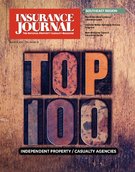North Carolina has made several changes encompassing fraud, captives and flood insurance regulations to its state insurance laws.
The legislation, House Bill 287, was approved June 30 by state lawmakers and signed into law July 6 by Gov. Pat McCrory. It was proposed by Insurance Commissioner Wayne Goodwin and incorporates various changes and amendments to the state’s current insurance laws that Goodwin had been pushing for, particularly strengthening North Carolina’s auto insurance rate evasion reform.
Goodwin claims that some are taking advantage of the state’s auto insurance rates as North Carolina’s are currently some of the lowest in the country.
A report from North Carolina TV station WRAL earlier this year found that out-of-state trucking companies are claiming to be in-state residents to obtain lower insurance rates, but actually have no operations in North Carolina.
“We want to protect and help the legitimate companies that are doing business here from being taken advantage of by businesses that are basically lying, that are misleading the state and misleading insurance companies as to their presence in this state,” Goodwin told WRAL.
Section 3.2, titled “Rate evasion fraud; prevention programs” stipulates the requirements to be considered an eligible insured for an insurance policy in the state. The new section also adds a stipulation that a “principal place of business” means the single location from which the majority of an applicant’s company operations are directed and controlled.
The new law makes it a Class 3 misdemeanor to deceive an insurer through presenting or helping to prepare false or misleading information to obtain auto insurance or vehicle registration for an ineligible risk. It is also now a Class H felony if any applicant violates the new section as rewritten to obtain auto insurance covering one or more vehicles operated using a commercial drivers’ license.
Starting Dec. 1, 2016, proof of North Carolina residency or eligible risk status will be required to obtain nonfleet private passenger motor vehicle insurance.
“North Carolina auto insurance rates are so low that individuals and companies from other states are actually attempting to obtain our low rates illegally,” said Goodwin. “I have added protections to these rates in this bill because low rates are a problem I am always happy to have.”
Of the 44 changes made to the state’s insurance laws, five focused on reforming North Carolina’s Captive Insurance Act and apply to currently licensed captive insurance companies and pending applications. Goodwin said the changes were designed to make the state more competitive to North Carolina business owners establishing their own captive insurance companies (CIC), as well as encourage non-resident CICs to re-domicile to North Carolina.
According to the North Carolina Captive Insurance Association, the most significant captive changes include:
- A CIC is exempt from the annual board meeting requirement if the CIC utilizes the services of at least two North Carolina service providers in the designated categories;
- North Carolina will now allow the licensing of a business entity in North Carolina as a CIC that is incorporated, formed or organized under the laws of another jurisdiction;
- Provisional approval is now available for an applicant business entity seeking a license for up to a 90-day period;
- The Commissioner now has the authority to grant an extension to a CIC to file its annual report;
The Commissioner is also vested with the discretion to deviate from North Carolina captive law requirements when setting the minimum capital and surplus for a protected cell CIC.
“North Carolina, with passage of these amendments, has become one of the most competitive jurisdictions in the nation in terms of captive insurance company growth. With over 300 licensed CICs, generating more than $700 million dollars in annual premium dollars, it’s only a matter of time before this is a billion-dollar industry for North Carolina. Captives are creating jobs and having a positive impact on the State’s economy,” chairman of NCCIA, Jesse Coyle, said in a statement after the bill was signed by the governor.
Other provisions passed in HB287 include enabling the establishment of a state-based private flood insurance market; enabling insurers to receive restitution from convicted defendants; and exempting certain Accountable Care Organizations from department regulation; as well as increasing the criminal penalty for large-scale fraud committed by an insurance fiduciary.
“House Bill 287 will allow us to continue serving and protecting North Carolina families, property owners and business owners at the high level they have come to expect from the Department of Insurance,” Goodwin said.
Topics Auto Legislation Fraud North Carolina
Was this article valuable?
Here are more articles you may enjoy.



 Lemonade Books Q4 Net Loss of $21.7M as Customer Count Grows
Lemonade Books Q4 Net Loss of $21.7M as Customer Count Grows  Experian Launches Insurance Marketplace App on ChatGPT
Experian Launches Insurance Marketplace App on ChatGPT  Insurance Broker Stocks Sink as AI App Sparks Disruption Fears
Insurance Broker Stocks Sink as AI App Sparks Disruption Fears  Former Broker, Co-Defendant Sentenced to 20 Years in Fraudulent ACA Sign-Ups
Former Broker, Co-Defendant Sentenced to 20 Years in Fraudulent ACA Sign-Ups 


